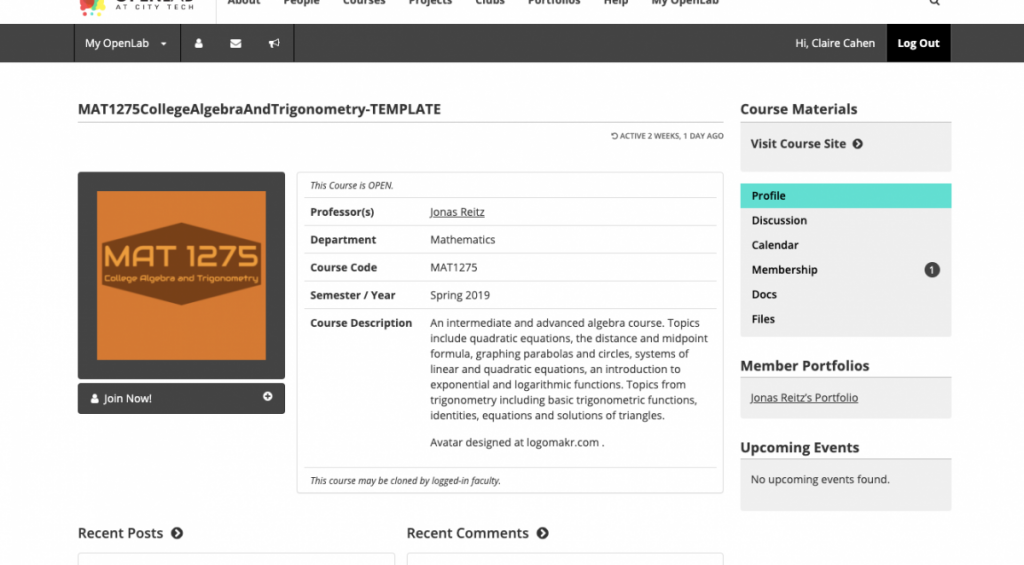This week, we spotlight the Mat1275 template course, which the Math department created to facilitate resource-sharing and cloning of the course among instructors. Such resource-sharing is a key way the OpenLab can help support open teaching and learning. Below, we focus on how the template site is built. We provide an overview that may be helpful to other departments wanting to create cloneable templates for their own introductory courses.
From the main menu, we see that the course’s homepage is set to the blogroll. This means that instructor and student posts will be featured on the home page in reverse chronological order. The Math department course uses a “template blogroll” in an innovative way. They create a first post, pinned prominently to the top of the page, which is a “Welcome post” directed not at students in potential Mat1275 courses but at instructors copying the template. The post gives instructions on how to clone the course. To make clear that these should be deleted once the course has been cloned, they are written in red.
Another template post is also featured on the site. It outlines a potential first assignment for Mat1275, which is simply to have students introduce themselves on the course site. Here too, the post has clear instructions which are worth citing at length:
“Write a comment in reply to this post (scroll to the bottom to find the “Leave a Reply” box). Your comment should be at least 2 paragraphs in length. In the first paragraph, introduce yourself in whatever way you wish (what do you want your classmates to know about you?). In the second paragraph, choose ONE of the following two topics and write a response. Don’t forget to tell us which topic you chose. Topics (choose ONE).
- Was math ever your favorite subject? If so, when was it? What about math made it your favorite? If math has never been your favorite subject, what about it do you not like?
- Sometimes people can recognize a time when their opinion of math dramatically changed either for the better or the worse. Tell us about it.”
The main menu links to a page in which instructors can write a brief description “About the Course.” This is a top-level page that, in a drop-down menu, links to other pages for the course syllabus, the course calendar, and course assignments. To make things easier for instructors cloning the template, a sample syllabus has already been drafted. Parts that will need to be customized (e.g. the grading guidelines) are, again, written in red. Another noteworthy detail here is that the course assignments page is in fact not a static page, but a category archive called “assignments.” Using a dynamic blogroll for assignments is useful if your coursework is interactive and will involve students commenting on instructor posts, or creating new posts themselves.
Finally, the template includes a top-level page for resources. A range of items appear in this drop-down menu from instructions on how to use WebWork to video resources to links to different City Tech offices that offer tutoring. Such resources are invaluable; using an OpenLab site to link out to them is a great strategy to make sure that students know that there are various tools to support them in their learning.
This template then, provides a rich starting point for Mat 1275 instructors. Those who clone the course will have a basic site architecture to work with. They will also have foundational content, from a model syllabus to sample assignments to key resources with which to provide students. The site is a great example of how to use the OpenLab to facilitate remixing and copying of course sites. A template like this, which can be customized throughout the semesters, gives departments a durable, open, and highly usable resource to support instructors. Thinking about creating a template site for another core course? Check out the Mat1275 template course for inspiration.




